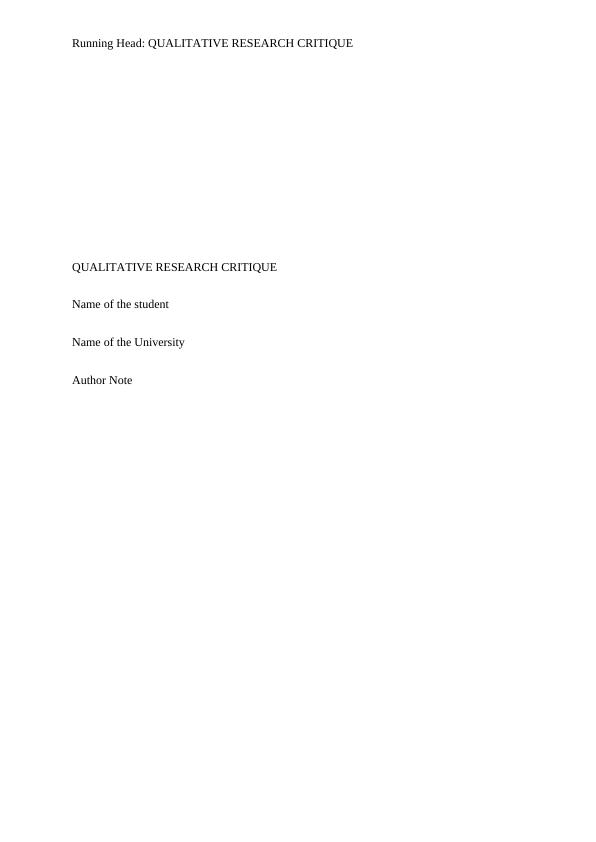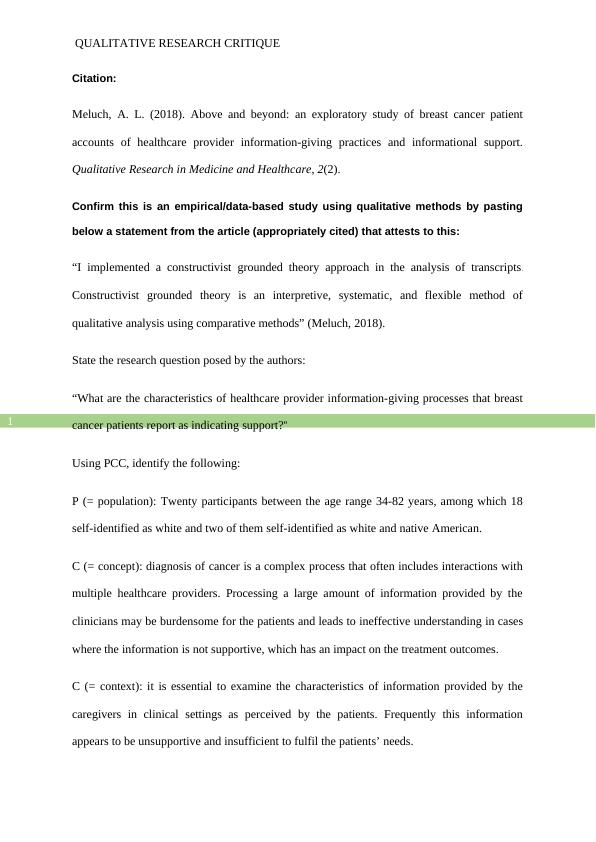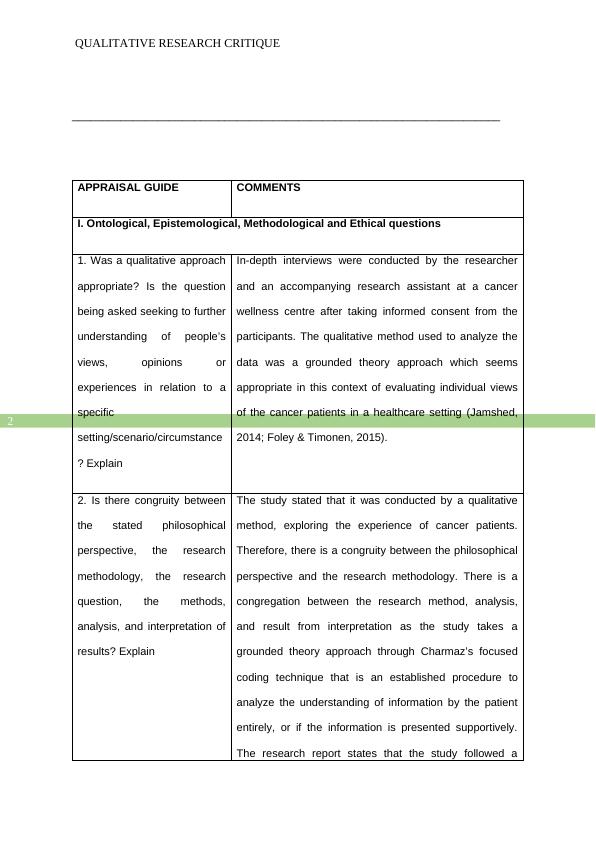Qualitative Research Critique | Assignment
Added on 2022-09-06
10 Pages2085 Words21 Views
Running Head: QUALITATIVE RESEARCH CRITIQUE
QUALITATIVE RESEARCH CRITIQUE
Name of the student
Name of the University
Author Note
QUALITATIVE RESEARCH CRITIQUE
Name of the student
Name of the University
Author Note

1
QUALITATIVE RESEARCH CRITIQUE
Citation:
Meluch, A. L. (2018). Above and beyond: an exploratory study of breast cancer patient
accounts of healthcare provider information-giving practices and informational support.
Qualitative Research in Medicine and Healthcare, 2(2).
Confirm this is an empirical/data-based study using qualitative methods by pasting
below a statement from the article (appropriately cited) that attests to this:
“I implemented a constructivist grounded theory approach in the analysis of transcripts.
Constructivist grounded theory is an interpretive, systematic, and flexible method of
qualitative analysis using comparative methods” (Meluch, 2018).
State the research question posed by the authors:
“What are the characteristics of healthcare provider information-giving processes that breast
cancer patients report as indicating support?”
Using PCC, identify the following:
P (= population): Twenty participants between the age range 34-82 years, among which 18
self-identified as white and two of them self-identified as white and native American.
C (= concept): diagnosis of cancer is a complex process that often includes interactions with
multiple healthcare providers. Processing a large amount of information provided by the
clinicians may be burdensome for the patients and leads to ineffective understanding in cases
where the information is not supportive, which has an impact on the treatment outcomes.
C (= context): it is essential to examine the characteristics of information provided by the
caregivers in clinical settings as perceived by the patients. Frequently this information
appears to be unsupportive and insufficient to fulfil the patients’ needs.
QUALITATIVE RESEARCH CRITIQUE
Citation:
Meluch, A. L. (2018). Above and beyond: an exploratory study of breast cancer patient
accounts of healthcare provider information-giving practices and informational support.
Qualitative Research in Medicine and Healthcare, 2(2).
Confirm this is an empirical/data-based study using qualitative methods by pasting
below a statement from the article (appropriately cited) that attests to this:
“I implemented a constructivist grounded theory approach in the analysis of transcripts.
Constructivist grounded theory is an interpretive, systematic, and flexible method of
qualitative analysis using comparative methods” (Meluch, 2018).
State the research question posed by the authors:
“What are the characteristics of healthcare provider information-giving processes that breast
cancer patients report as indicating support?”
Using PCC, identify the following:
P (= population): Twenty participants between the age range 34-82 years, among which 18
self-identified as white and two of them self-identified as white and native American.
C (= concept): diagnosis of cancer is a complex process that often includes interactions with
multiple healthcare providers. Processing a large amount of information provided by the
clinicians may be burdensome for the patients and leads to ineffective understanding in cases
where the information is not supportive, which has an impact on the treatment outcomes.
C (= context): it is essential to examine the characteristics of information provided by the
caregivers in clinical settings as perceived by the patients. Frequently this information
appears to be unsupportive and insufficient to fulfil the patients’ needs.

2
QUALITATIVE RESEARCH CRITIQUE
______________________________________________________________________
APPRAISAL GUIDE COMMENTS
I. Ontological, Epistemological, Methodological and Ethical questions
1. Was a qualitative approach
appropriate? Is the question
being asked seeking to further
understanding of people’s
views, opinions or
experiences in relation to a
specific
setting/scenario/circumstance
? Explain
In-depth interviews were conducted by the researcher
and an accompanying research assistant at a cancer
wellness centre after taking informed consent from the
participants. The qualitative method used to analyze the
data was a grounded theory approach which seems
appropriate in this context of evaluating individual views
of the cancer patients in a healthcare setting (Jamshed,
2014; Foley & Timonen, 2015).
2. Is there congruity between
the stated philosophical
perspective, the research
methodology, the research
question, the methods,
analysis, and interpretation of
results? Explain
The study stated that it was conducted by a qualitative
method, exploring the experience of cancer patients.
Therefore, there is a congruity between the philosophical
perspective and the research methodology. There is a
congregation between the research method, analysis,
and result from interpretation as the study takes a
grounded theory approach through Charmaz’s focused
coding technique that is an established procedure to
analyze the understanding of information by the patient
entirely, or if the information is presented supportively.
The research report states that the study followed a
QUALITATIVE RESEARCH CRITIQUE
______________________________________________________________________
APPRAISAL GUIDE COMMENTS
I. Ontological, Epistemological, Methodological and Ethical questions
1. Was a qualitative approach
appropriate? Is the question
being asked seeking to further
understanding of people’s
views, opinions or
experiences in relation to a
specific
setting/scenario/circumstance
? Explain
In-depth interviews were conducted by the researcher
and an accompanying research assistant at a cancer
wellness centre after taking informed consent from the
participants. The qualitative method used to analyze the
data was a grounded theory approach which seems
appropriate in this context of evaluating individual views
of the cancer patients in a healthcare setting (Jamshed,
2014; Foley & Timonen, 2015).
2. Is there congruity between
the stated philosophical
perspective, the research
methodology, the research
question, the methods,
analysis, and interpretation of
results? Explain
The study stated that it was conducted by a qualitative
method, exploring the experience of cancer patients.
Therefore, there is a congruity between the philosophical
perspective and the research methodology. There is a
congregation between the research method, analysis,
and result from interpretation as the study takes a
grounded theory approach through Charmaz’s focused
coding technique that is an established procedure to
analyze the understanding of information by the patient
entirely, or if the information is presented supportively.
The research report states that the study followed a

End of preview
Want to access all the pages? Upload your documents or become a member.
Related Documents
Worksheet for Critical Appraisal of Qualitative Studylg...
|10
|2284
|23
Assignment On Citation:. (Hazemba, Ncama, & Sithole, 2016)lg...
|5
|1661
|13
Qualitative Research Methods for Public Healthlg...
|12
|3012
|358
Impact of Breast Cancer on Survivor with Spouselg...
|16
|1624
|30
Qualitative Research Critical Appraisallg...
|5
|1014
|16
Strategies of Government in Preventing Breast Cancer Aged 25-45lg...
|21
|7518
|58